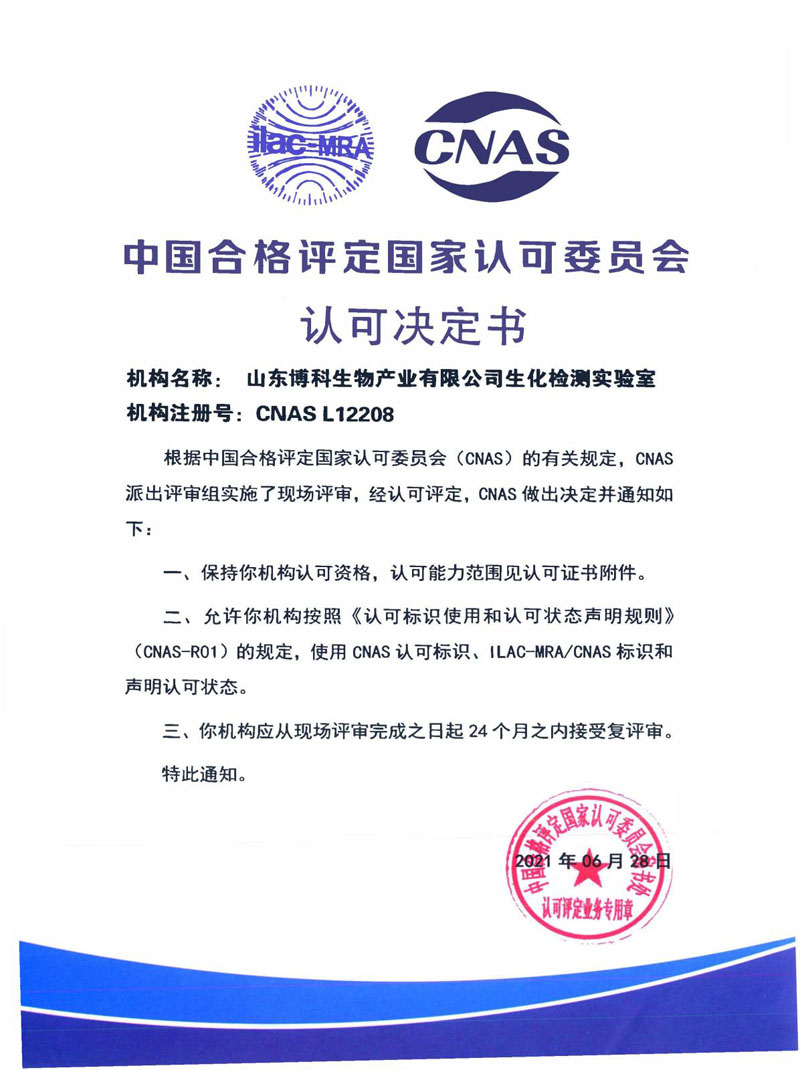China National Accreditation Service for Conformity Assessment (hereinafter referred to as CNAS) is the national accreditation body of China unitarily responsible for the accreditation of certification bodies, laboratories and inspection bodies, which is established under the approval of the Certification and Accreditation Administration of the People’s Republic of China (CNCA) and authorized by CNCA in accordance with the Regulations of the People’s Republic of China on Certification and Accreditation.
History
CNAS was founded on March 31, 2006 by merging the former China National Accreditation Board for Certifiers (CNAB) and China National Accreditation Board for Laboratories (CNAL).
CNAB was the national accreditation body responsible for the accreditation of management system certification bodies and product certification bodies, which was founded in July 2002 by the authorization of CNCA according to relevant laws and regulations. CNAB had merged the former China National Accreditation Council for Registrars (CNACR), China National Accreditation Council for Products (CNACP), China National Accreditation Board for Import & Export Enterprises (CNAB) and former China Accreditation Committee for Environmental Management System Certification Bodies (CACEB). In April 2004, the accreditation functions related to occupational health and safety management system certification bodies and organic product certification bodies of former China National Accreditation Board for OSHMS Certification Bodies (CNASC) and organic food accreditation committee were transferred to CNAB according to the co-decisions of CNCA and relevant competent authorities, which had further advanced the intensive fusion of unified accreditation systems for certification bodies.
CNAL was the national accreditation body responsible for the accreditation of laboratories and inspection bodies and related activities, which was established by the approval of CNCA and authorized by CNCA. CNAL was established on July 4, 2002 by merging the former China National Accreditation Committee for Laboratories (CNACL) established by the former State Bureau of Technical Supervision, and the former China Entry-Exit Inspection and Quarantine Laboratory Accreditation Committee (CCIBLAC) established by the former Entry-Exit Inspection and Quarantine Bureau.
Organizational Structure
CNAS is composed of the Board, Executive Committee, Technical Committee for Certification Body, Technical Committee for Laboratory, Technical Committee for Inspection Body, Appraisal Committee, Appeal Handling Committee、End-User Committee and Secretariat. The CNAS Board is composed of the members from 65 organizations representing 5 interested parties e.g. government, conformity assessment bodies, clients of conformity assessment service, users of conformity assessment and technical experts.
Purpose
The purpose of CNAS is to promote conformity assessment bodies to strengthen their development in accordance with the requirements of applicable standards and specifications, and to facilitate the conformity assessment bodies to effectively provide service to the society by means of impartial conduct, scientific means and accurate results.
Mission
The mission of CNAS is:
(1) To establish and operate the national accreditation system for conformity assessment bodies, and to develop and issue the normative documents e.g. rules, criteria and guidance etc for accreditation, in accordance with relevant national laws and regulations as well as international and national standards and specifications;
(2) To assess the competence of local or foreign applicant conformity assessment bodies, make accreditation decisions, and conduct accreditation-related surveillance and management on accredited conformity assessment bodies;
(3) To assume the responsibility for directing and regulating the uses of CNAS logo and accreditation symbols;
(4) To organize personnel training related to accreditation, and to qualify, recruit and manage the accreditation personnel;
(5) To offer relevant technical services to conformity assessment bodies, and to provide society with publicly available information about accredited conformity assessment bodies;
(6) To participate in international activities related to conformity assessment and its accreditation, and to sign bilateral or multi-lateral accreditation cooperation agreements with relevant accreditation bodies, related bodies or international organizations;
(7) To deal with appeals and complaints related to accreditation;
(8) To undertake tasks assigned by relevant government departments;
(9) To carry out other activities related to accreditation.
The CNAS Secretariat is residing inside the China National Accreditation Institute of Conformity Assessment (CNAI), CNAI is affiliated to the State Administration for Market Regulation, only engaged in accreditation-related businesses and doesn’t provide any services that may compromise impartiality.
International Mutual Recognition
China national accreditation system for conformity assessment has been a part of international accreditation multilateral recognition system, and is playing an important role in it.
CNAS was the accreditation body member of International Accreditation Forum (IAF) and International Laboratory Accreditation Cooperation (ILAC),as well as the member of Asia Pacific Laboratory Accreditation Cooperation (APLAC) and Pacific Accreditation Cooperation (PAC). The Asia Pacific Accreditation Cooperation (APAC) was established on 1 January 2019 by the amalgamation of two former regional accreditation cooperations – the APLAC and the PAC.
Our company’s biochemical testing laboratory passed the on-site audit of the review team sent by CNAS.
CNAS has signed a mutual recognition agreement (APLAC-MRA) with the Asia-Pacific Laboratory Accreditation and International Laboratory Accreditation Cooperation Organization. Therefore, the test report issued by the laboratory accredited by CNAS can be recognized by the national and regional accreditation bodies of the parties that have signed the mutual recognition agreement. The laboratories accredited by CNAS more reflect the needs of international mutual recognition, and the laboratory qualification accreditation reflects the legal requirements of the Chinese government for laboratory management.
Post time: Oct-26-2021


